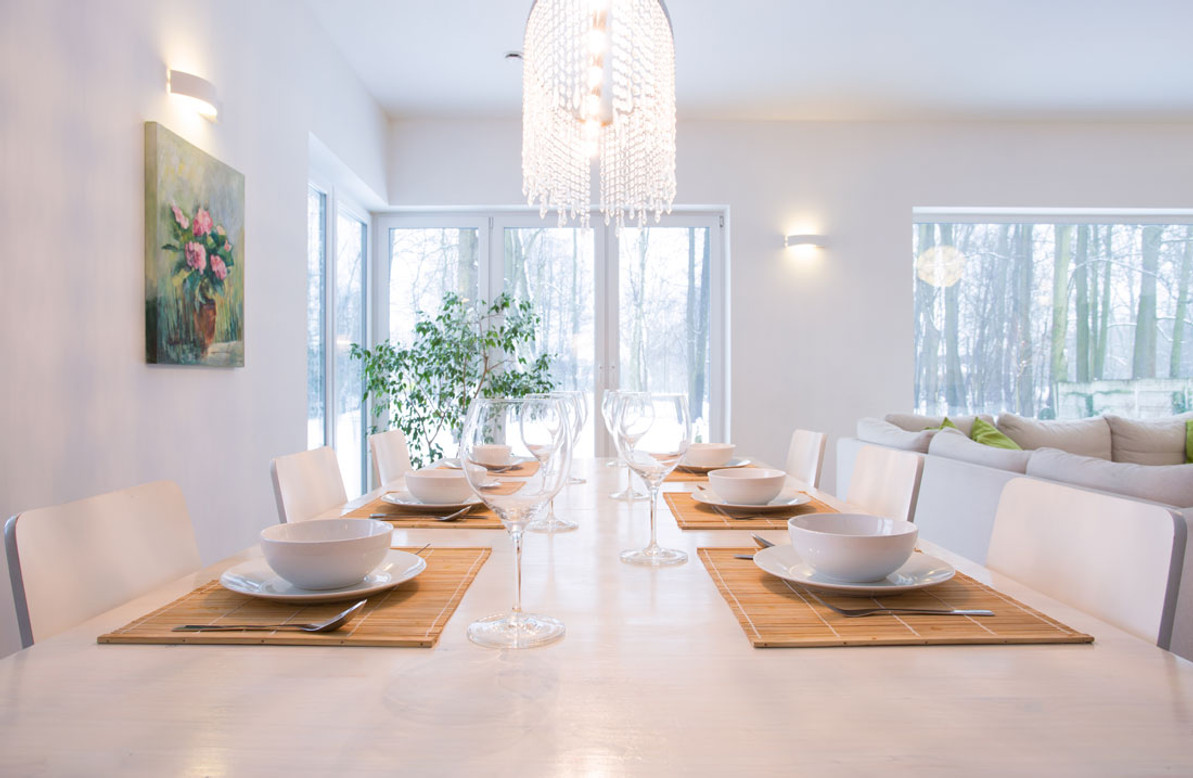The Ultimate Guide to Selecting and Installing Chandeliers
With their timeless and luxurious appeal, chandeliers add elegance and grandeur to any interior. They create a captivating focal point and add ambiance to a space. With both traditional and contemporary chandeliers available, they are versatile lighting solutions that can complement a wide variety of interior design themes.
The Essence of Chandeliers: A Graceful Blend of Style and Function
Chandeliers are decorative light fixtures which are suspended from the ceiling by a chain, rod, or cord. They typically feature multiple arms or branches that hold light bulbs or candles. They are designed to add elegance, beauty, and a touch of grandeur to a room. Chandeliers can be made from various materials such as crystal, glass, metal, or even plastic.
Historically, chandeliers were originally used to hold candles, dating back to medieval times. They were essential for providing light in large halls, palaces, and churches before the advent of electricity. As technology progressed, they evolved to incorporate electric light bulbs, offering a more convenient and safer lighting option.
In modern times, chandeliers are primarily used for decorative purposes, enhancing overall aesthetics and creating a desired ambiance. They are commonly found in dining rooms, foyers, ballrooms, formal living rooms, restaurants, hotels, and other large areas. They come in various styles and sizes, ranging from traditional, ornate designs to sleek, contemporary ones ensuring there are options catering to a wide range of interior decor preferences.
The positioning of a chandelier and the type of lighting it provides can significantly influence the ambience of a room. They often serve as a focal point in interior design and can elevate the overall visual appeal of a space, contributing to a more luxurious and sophisticated atmosphere.
Chandeliers are decorative light fixtures which are suspended from the ceiling by a chain, rod, or cord. They typically feature multiple arms or branches that hold light bulbs or candles. They are designed to add elegance, beauty, and a touch of grandeur to a room. Chandeliers can be made from various materials such as crystal, glass, metal or even plastic.
Historically, chandeliers were originally used to hold candles, dating back to medieval times. They were essential for providing light in large halls, palaces, and churches before the advent of electricity. As technology progressed, they evolved to incorporate electric light bulbs, offering a more convenient and safer lighting option.
In modern times, chandeliers are primarily used for decorative purposes, enhancing overall aesthetics and creating a desired ambience. They are commonly found in dining rooms, foyers, ballrooms, formal living rooms, restaurants, hotels and other large areas. They come in various styles and sizes, ranging from traditional, ornate designs to sleek, contemporary ones ensuring there are options catering to a wide range of interior decor preferences.
The positioning of a chandelier and the type of lighting it provides can significantly influence the ambience of a room. They often serve as a focal point in interior design and can elevate the overall visual appeal of a space, contributing to a more luxurious and sophisticated atmosphere.
Classic Beauty: Exploring Traditional Chandelier Designs
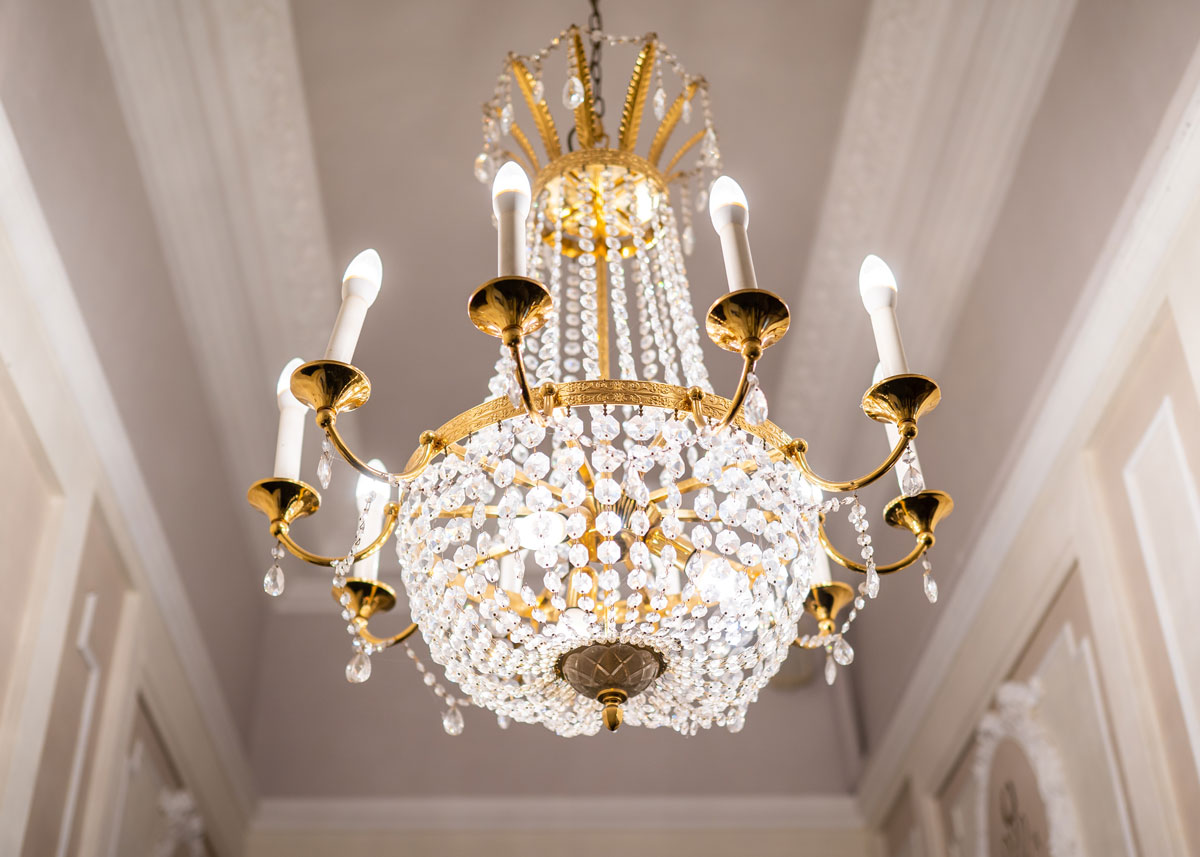
The appeal of traditional chandelier designs lies in their timeless elegance, classic beauty, and the sense of luxury and opulence they bring to a space.
Aesthetic appeal
Traditional chandeliers feature intricate and ornate designs that exude a sense of grandeur and sophistication. Their timeless design ensures they’ll always stay in style, making them a worthy investment. The combination of high-quality materials such as glass, metal and crystal adds to their visual appeal and sense of luxury. They create a captivating focal point in grand, traditional interiors, whether a large private home or luxury commercial space.
This classic 12-lamp chandelier features a traditional candleholder design and a gorgeous gold finish. It’s a great example of a traditional chandelier design that would look superb in any grand, classic interior or formal space.
Warm and inviting atmosphere
Classic chandeliers typically emit a warm and soft glow, creating a cosy and inviting atmosphere in any room. This warm illumination can enhance the overall mood and comfort of the space. This makes them ideal for entertainment and leisure spaces such as grand hotels, ballrooms, and luxury foyers.
Historical and cultural significance
Traditional chandelier designs often draw inspiration from historical periods. As such, they evoke a sense of nostalgia and cultural significance, reminding us of the craftsmanship and artistry of times gone by. For this reason, classic chandeliers are perfect for installation in historical buildings, banquet halls, luxury hotels, luxury cruise ships, theatres and opera houses.
Contemporary Elegance: Embracing Modern Chandelier Trends
Contemporary chandeliers are a modern take on the classic chandelier design. Unlike traditional chandeliers, which are often associated with ornate and intricate details, contemporary chandeliers embrace minimalist, sleek and innovative aesthetics. They are characterised by clean lines, geometric shapes, and a focus on functionality while still making a bold statement in the space they occupy.
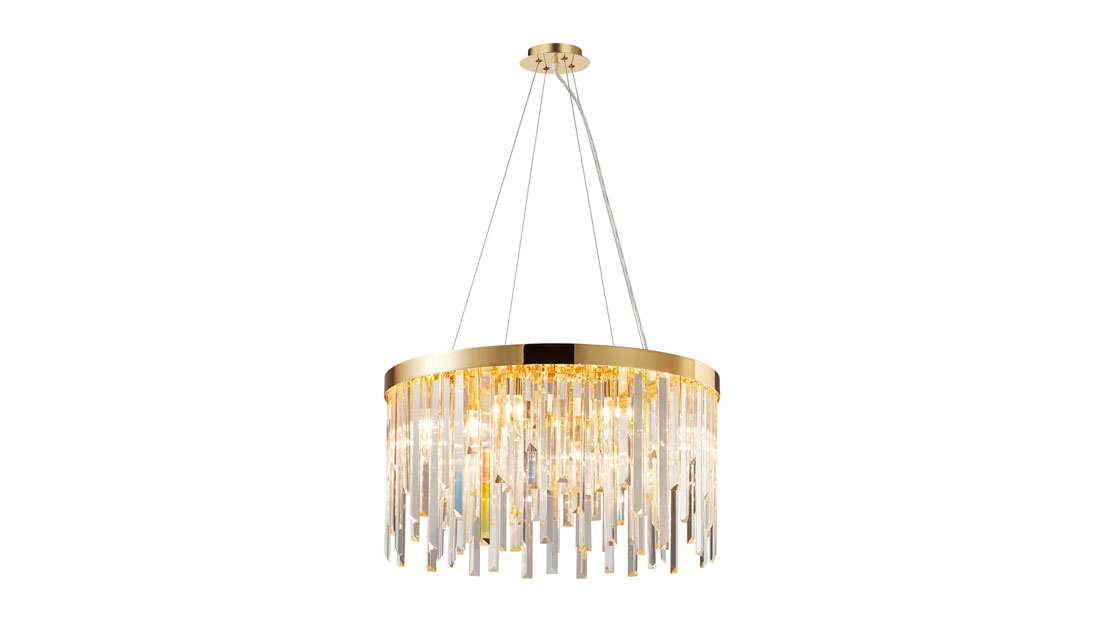
Key features of contemporary chandeliers include:
Minimalism
Contemporary chandeliers typically have a minimalist design, with simple forms and clean shapes. They often feature fewer embellishments compared to traditional chandeliers.
A wider range of materials
Contemporary chandeliers can be made from a wider range of materials, including glass, metal, acrylic, fabrics and even recycled materials. There is an emphasis on using modern, innovative and sustainable materials.
Unique designs
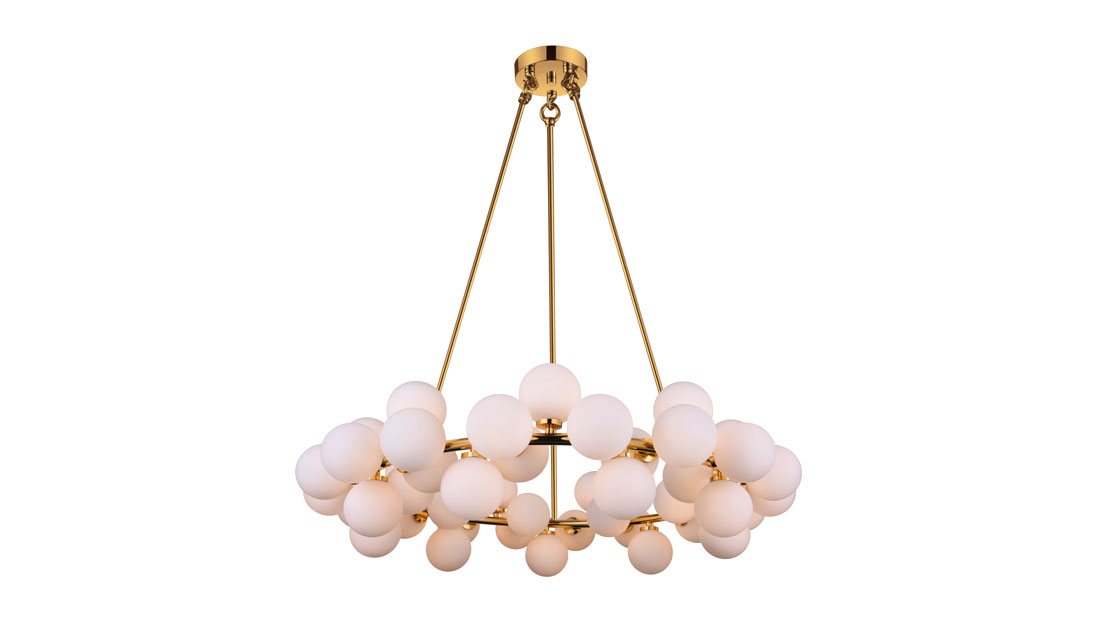
Contemporary chandeliers come in a variety of unconventional and eye-catching designs. They may incorporate asymmetry, abstract shapes and artistic elements, pushing the boundaries of traditional chandelier aesthetics.
Integrated LED lighting and technology
Many contemporary chandeliers use energy-efficient LED lighting technology, providing bright and versatile illumination while reducing energy consumption. Some contemporary chandeliers incorporate smart lighting features, allowing for remote light intensity control and colour customisation.
This modern LED chandelier is an excellent example of a contemporary design with the additional benefit of CCT and dimmable technology.
Versatility
Contemporary chandeliers are designed to complement modern interior décor styles, making them versatile enough to fit into various settings, including residential spaces and commercial environments such as restaurants, hotels, boutique retail stores, and showrooms.
Size and scale
Contemporary chandeliers can be large and grand, serving as a focal point, or they may be more compact and suitable for smaller spaces. It is often possible to match contemporary chandeliers with complementary wall lights in a chandelier design for a stunning layered lighting effect and coherent interior lighting design.
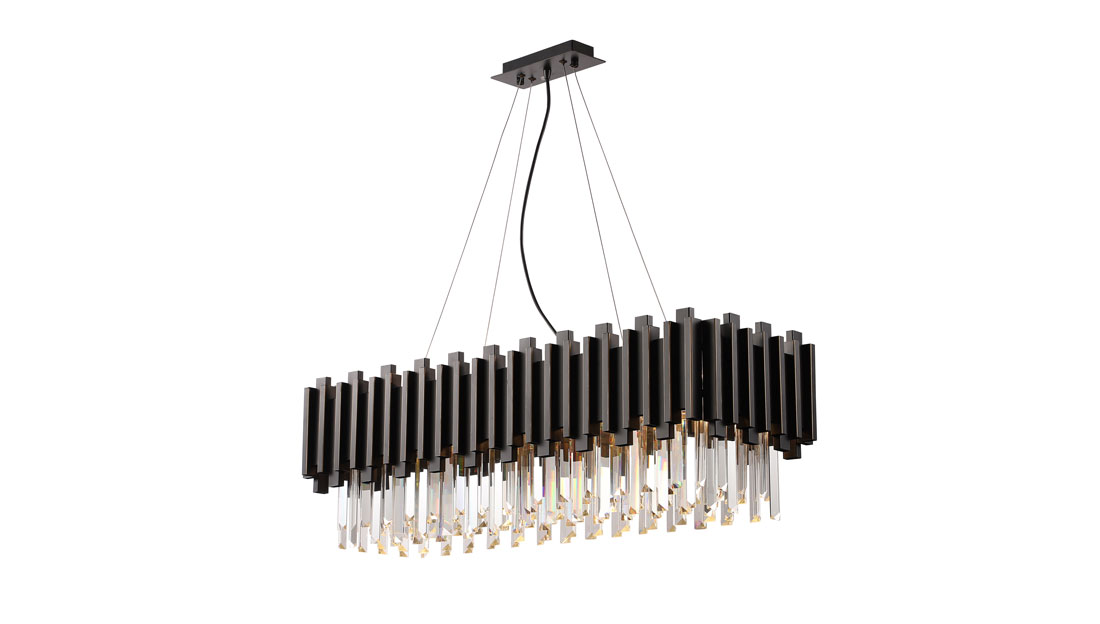
Contemporary chandeliers offer an exciting and fresh perspective on lighting design, making them popular choices for modern homes, offices, hotels, and public spaces. They add a touch of sophistication and elegance to contemporary interiors while embracing the innovative spirit of the present era. With their diverse designs and materials, contemporary chandeliers cater to a wide range of tastes and interior styles, providing a creative and functional lighting solution for various settings.
Choosing the Perfect Chandelier: A Guide to Finding Your Statement Piece
Choosing the perfect chandelier for your interior can be an exciting yet challenging task. To ensure you make the right choice, consider the following factors:
Size and scale
Measure the dimensions of the room and the height of the ceiling. The chandelier should complement the size of the space without overpowering it. As a general rule, the chandelier’s diameter, in inches, should be roughly equal to the sum of the room’s length and width in feet. For example, a room 12 feet long and 10 feet wide would require a chandelier with a diameter of around 22 inches.
Ceiling height
It’s important to consider the ceiling height when selecting a chandelier. High ceilings can accommodate more substantial and multi-tiered chandeliers. If you have lower ceilings, consider a flush or semi-flush mount chandelier.
This round crystal flush-mounted chandelier in French gold is an excellent example of a decorative chandelier that is perfect for rooms with lower ceilings.
Lighting needs
Consider the primary purpose of the chandelier. Will it be the main lighting source in the room or more of a decorative accent? Consider the level of brightness required as well as the desired lighting colour. Do you have a preference for the type of bulbs the chandelier accommodates? Do you require dimmer or colour-changing capabilities?
Material and finish
Choose materials and finishes that complement the room’s decor. Options include crystal, glass, metal, fabric, and more. Consider the chandelier’s finish in relation to other fixtures and furnishings in the space. For example, if you have gold accents in your room, you may want to select a chandelier in a gold finish to complement these.
Shape and design
Chandeliers come in various shapes, such as linear, round, oval, or abstract. Consider the room’s layout and furniture arrangement when choosing the chandelier’s shape. This large rectangle chandelier, for example, is ideal for placement in lengthy rectangular spaces.
Maintenance and cleaning
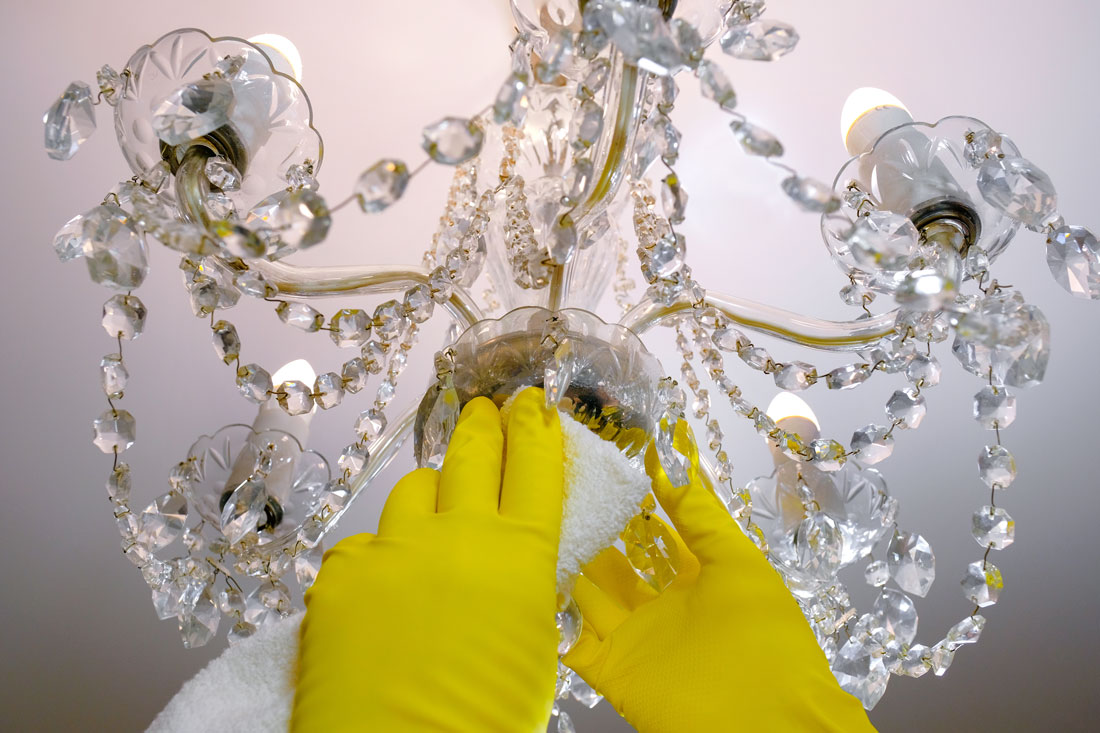
Some chandeliers require more maintenance and cleaning than others, especially those with intricate designs or crystal components. Consider the practicality of cleaning the chandelier regularly.
Budget
Set a budget for your chandelier purchase. Chandeliers can vary significantly in price, so knowing your budget will help you narrow down your options.
This diamond-detailed stunning modern chandelier is an excellent example of a gorgeous chandelier at a more budget-friendly price.
Personal preference
Ultimately, you should choose a chandelier that resonates with your personal taste and brings you joy. It should reflect your style and preferences while adding value to the overall interior design.
When shopping for chandeliers, it’s a good idea to visit lighting showrooms or browse online retailers to see various options and visualise how they might look in your space. Use the tips in this section to create a list of essential features to help you narrow down your search.
Installation and Placement: Illuminating Your Space with Brilliance
Proper placement and installation of chandeliers are essential to ensure they look their best and function optimally. You may find the following tips useful for chandelier placement and installation:
Height and clearance
To provide enough clearance and avoid head bumps, the bottom of the chandelier should generally be at least 7 feet above the floor. In rooms with a higher ceiling, you can hang the chandelier slightly higher but try to maintain a balanced and proportional look within the space.
Dining table chandeliers
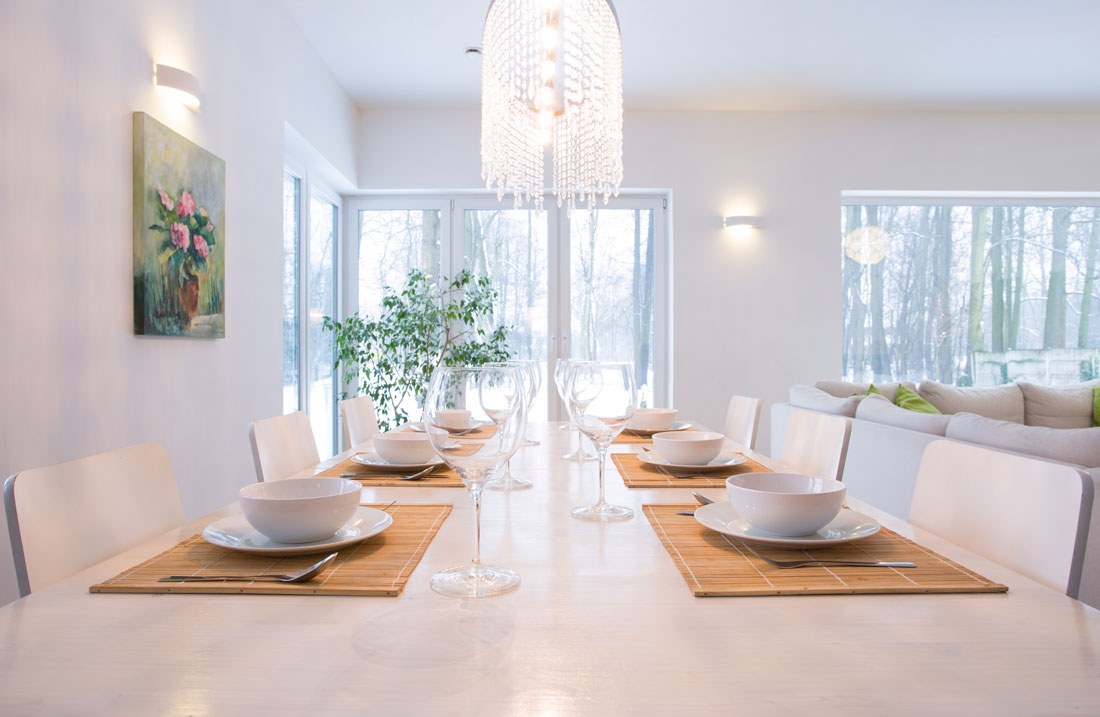
When installing chandeliers in dining rooms, the bottom of the chandelier should be around 30 – 36 inches above the dining table’s surface. This allows for proper illumination during meals without obstructing the view across the table.
Entryway and foyer chandeliers
The placement of chandeliers in entryways and foyers can vary depending on the ceiling height and room proportions. The chandelier can be hung at a lower level in grand entryways with high ceilings to create a dramatic effect. In smaller entryways or foyers, consider a flush or semi-flush mount chandelier.
Staircases and high ceilings
When installing chandeliers above staircases or in rooms with high ceilings, ensure the chandelier is centered and proportional to the space. Be mindful of safety and consider using a lift or scaffold to safely install chandeliers in high-ceiling areas.
Multiple tier chandeliers
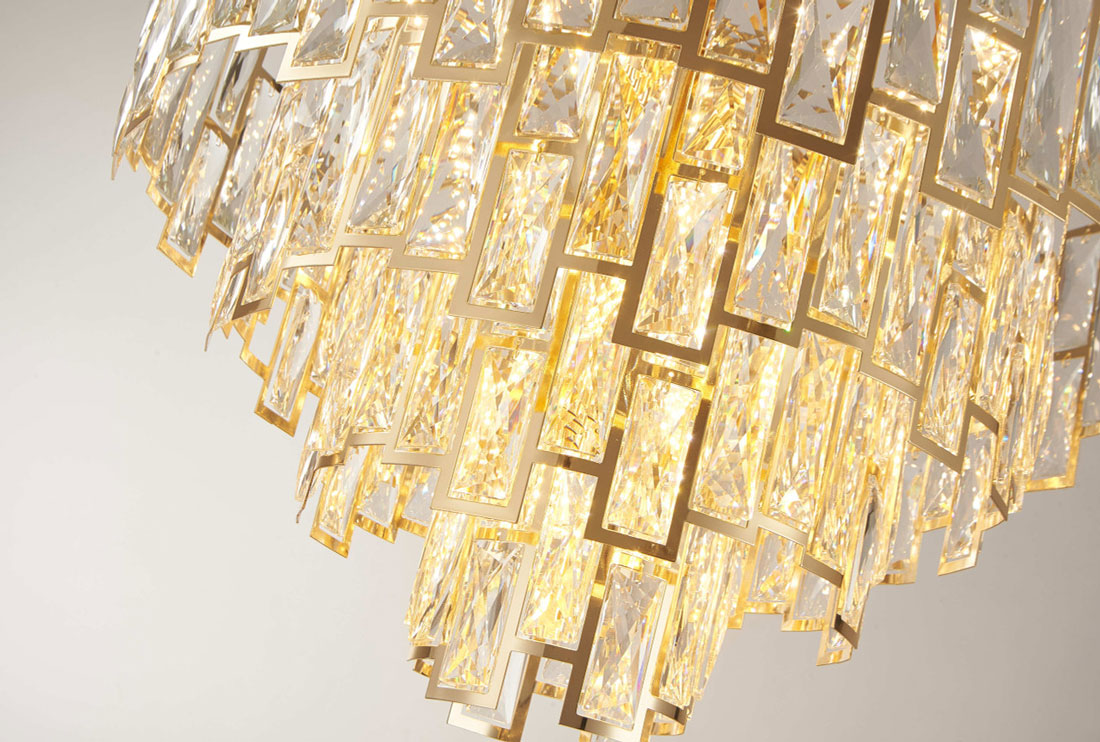
If you have a multi-tier chandelier, ensure each tier is leveled and balanced. Take extra care to align the arms and elements properly during installation.
Electrical considerations
Before installation, check the electrical wiring and power supply to ensure it can handle the load of the chandelier. If necessary, consult an electrician to make any required adjustments. Consider your level of electrical expertise. If you are not familiar with electrical work and wiring, it is best to leave the installation to a qualified electrician. They have the knowledge and expertise to handle electrical connections safely and in compliance with building standards and regulations.
Anchoring and support
Chandeliers can be heavy, especially if they are made of crystal or metal. Use a ceiling support suitable for the chandelier’s weight and ceiling material, such as a joist or mounting bracket. Never rely solely on a ceiling electrical box, as it may not be designed to bear the weight of a heavy chandelier.
Use a level
When installing the chandelier, use a level to ensure it hangs straight and doesn’t appear crooked.
Securely fasten all elements
Check that all chandelier crystals, shades, and other elements are securely fastened before and after installation.
Remember that proper chandelier placement and installation ensure safety and enhance the fixture’s visual appeal and functionality within your space. If in doubt, seeking professional help is always a good idea to ensure a successful and secure installation.
Chandeliers bring timeless charm and elegance to an interior. With a wide variety of designs and styles available, there is a chandelier to suit virtually any space. Whether you’re looking for a classic or contemporary design, a chandelier can create a stunning focal point and bring a sense of grandeur to your interior. Follow the tips in this guide to help you choose and install the perfect chandelier.
Recent Posts
-
One Light, Every Mood: How CCT Colour-Changeable Flush Lights Are Replacing Multiple Fittings in 2026
In 2026, lighting is no longer a fixed decision you live with for years. Homes are more flexible, s …2nd Feb 2026 -
The Quiet Revolution in Ceilings: A New Way to Think About Downlighting
There’s a soft shift happening above us. Not in the architecture of walls or floors, but in the oft …21st Jan 2026 -
The Ultimate Guide to Switches and Sockets for Every Room
How to make stylish, sensible choices that work with your lifestyle and elevate your interiors. I …13th Jan 2026

